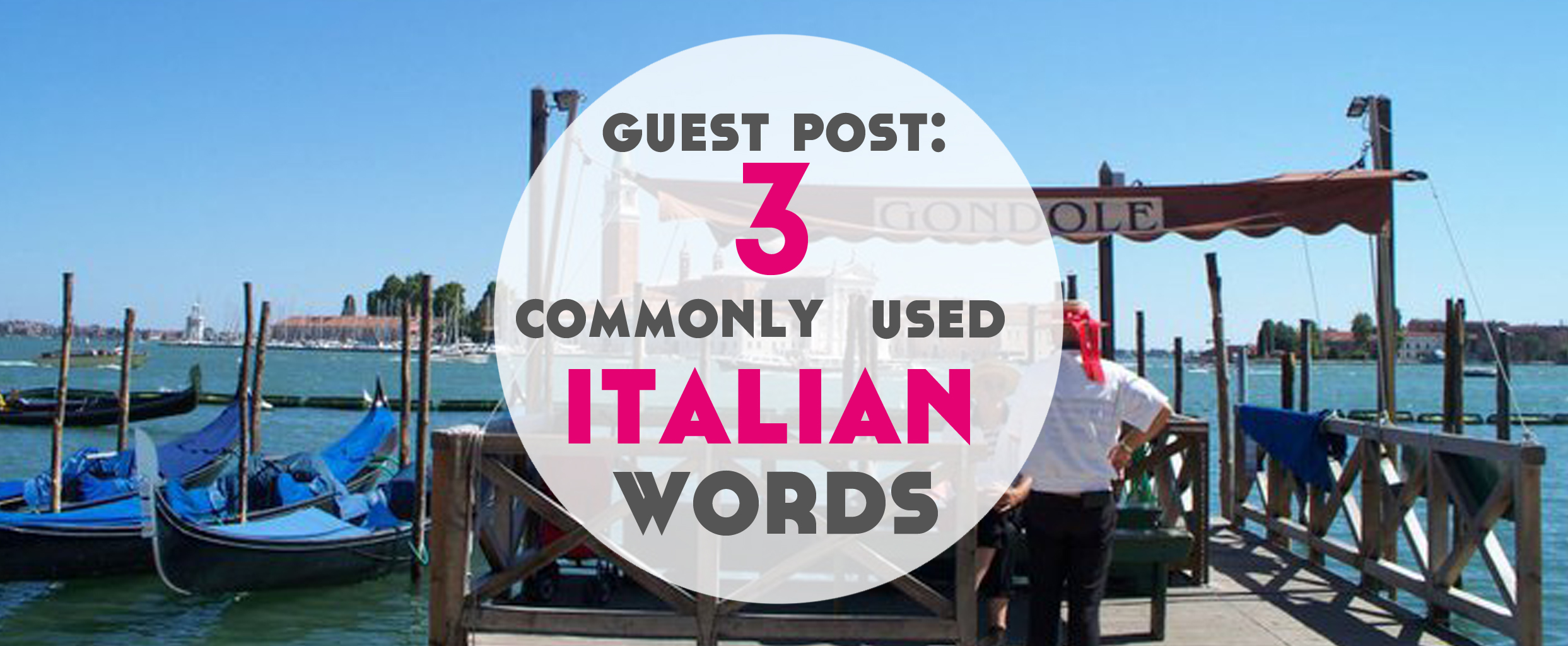November 16th, 2015
Guest Post: 3 Commonly Used Italian Words Every Beginner Should Know
A couple of months ago, I asked those of you on my mailing list (you can sign up here!) which languages you’re studying right now. I did so to bring you better content aimed at you and your needs right now.
Loads of you said you were studying Italian, which is a language I’ve studied but also a language that sits in a dusty corner of my brain covered in cobwebs.
So I invited the awesome Italian (and now Mandarin!) language blogger, Cher Hale of The Iceberg Project, to share some commonly used Italian words. I’ll leave you in her trusted hands.

When you start learning Italian, it can feel like there are a hundred and two things you need to learn at once.
There are verb endings, gorgeous-sounding and very foreign vocabulary words, fun cultural tidbits, and of course, the grammar, or how all of the words you’re learning go together into something that makes sense to a native speaker’s ears.
Naturally, your first sentences in Italian are going to be short and simple.
“I am American. I like to read. More tiramisù, please.”
However, you can sound more natural and therefore feel more confident when you try to speak Italian just by adding a handful of commonly used Italian words to your list.
I’m talking about connector words.
The little words like “so”, “then”, and “however” that stop your sentences from sounding so stilted and so unlike you.
There are the basic ones, like “perché? – why?”, “o – or,” “e – and,” or “ma – but.”
Those are great, but they can’t pull together every sentence, so what commonly used words in Italian can? Let’s take a look at 3 brilliant examples in this post.
3 commonly used italian words
1.) Quindi – So
After just ten minutes in my intermediate Italian class in Italy, my teacher had already dropped ten “quindi’s” while speaking rapid Italian.
(That’s a “quindi” a minute!)
As soon as I got back to my dorm room, I opened up WordReference and learned that “quindi” means “so”, “then” or “therefore.”
“So” is the easiest way to think of it.
Here are some examples of how you can use it:
Amo la cultura italiana, quindi sto imparando l’italiano. – I love Italian culture, SO I’m learning Italian.
Mi sono innamorato di una ragazza italiana, quindi mi trasferisco in Italia. – I fell in love with an Italian girl, SO I’m moving to Italy.
Lindsay adora imparare le lingue, quindi ha iniziato un sito per coloro che vogliono imparare un’altra lingua. – Lindsay adores learning languages, so she started a website for those who want to learn another language.
2.) Allora – So, then, well
If you sit on a bench in a piazza in Italy for a few hours to eavesdrop, I’m willing to bet that you’ll hear the word “allora” used at least once every five minutes.
It’s incredibly common and diverse, which makes it a must for you to know.
I could write a tiny book on all of the ways to use “allora”, but for the sake of simplicity, here are the most common ways to use it:
Allora, ecco il programma di oggi. – SO, here’s the plan for today.
In this case, “allora” is being used to introduce an explanation.
Ci vediamo, allora! – We’ll see each other THEN!
In this sentence, “allora” is being used to pinpoint a later time.
Ok, allora, che facciamo? – Ok, WELL, what are we doing?
In this example, “allora” is being used to introduce a question, and it’s probably being used in this way after a conversation about plans that led to no decision.
Se vuoi imparare l’italiano, allora dovrai studiare ogni giorno. – If you want to learn Italian, THEN you should study every day.
Here, “allora” is being used as a connecting word in an “if…then” statement.
3.) Poi – Then
When you go to any store in Italy where you have to ask someone for help to get bread, cheese, desserts, etc., you’re going to hear the phrase “E poi?” after you order your first item.
This just means “And then?”
Besides being used in market situations, it’s also a great connector for making short lists or describing a series of events.
Andiamo in Toscana e poi facciamo un giro in Umbria. – We’re going to Tuscany and then, we’re taking a short trip to Umbria.
Vorrei due cornetti vuoti, e poi…un caffè. – I would like two plain croissants, and then…an espresso.
E poi mi ha baciato! – And then, he kissed me!
Here are a couple other common connector words that you might need:
Comunque – However, anyway
Pero (used as a synonym for “ma”)
To find out more about Cher and The Iceberg Project, check out her blog here.
Related: 9 Reasons to Learn Italian







